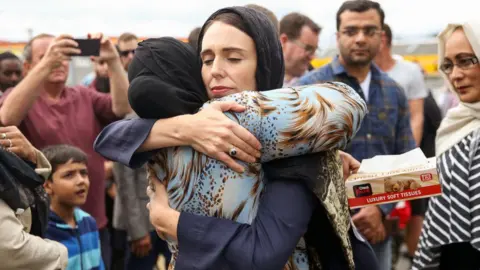Why Jacinda Ardern's star waned in New Zealand
Jacinda Ardern came to the prime ministership of New Zealand by what amounted to an accident and had her five-year term defined by a series of crises.
Her management of those crises, particularly the 2019 Christchurch mosque massacre of 51 Muslims by a gunman, won her international acclaim.
And initially, her management of Covid-19 saw her lead her Labour Party to a landslide victory in 2020, but as draconian lockdowns kept New Zealanders at home and its borders closed, her popularity began to wane.
She has been the subject of often-vile abuse by the anti-vax movement and other populist-inspired right-wing protest groups in New Zealand.
It was evident in her resignation remarks on Thursday that the pressure had had an impact and caused her to doubt whether she could lead her party into the election scheduled for October.
"This summer, I had hoped to find a way to prepare not just for another year but another term because that is what this year requires; I have not been able to do that," she said.
Ms Ardern, 42, was born to a Mormon family in the North Island city of Hamilton. Her father was a police officer.
From that conservative background, she went to Waikato University in Hamilton and did a communications degree and then rejected Mormonism because of its stance on homosexuality.
She worked for former New Zealand Prime Minister Helen Clark and for Tony Blair's UK government, before being elected an MP in 2008.
By 2017 as the Labour Party saw its poll ratings stay low under the dour leadership of Andrew Little, she was elected his deputy and quickly developed a following. Mr Little resigned eight weeks before the election, and Ms Ardern took over.
During the election campaign, she was dismissed by her critics as offering little more than stardust. But under New Zealand's proportional representation system, even though Labour won only 36.9% of the vote against the centre-right National Party's 44.5%, it was able to become the government after forming a coalition with the populist New Zealand First party.
That proved to be a political millstone around Ms Ardern's neck as the party's mercurial leader, Winston Peters, opposed many of Labour's cherished policies, such as a capital gains tax.
Ms Ardern made Mr Peters minister of foreign affairs and largely left him alone, initially taking, it seemed, very little interest in non-domestic matters herself.
That all changed with the massacre, and she found herself heading an international effort along with French President Emmanuel Macron called "the Christchurch Call" to try to get social media companies to restrict the ability of users to post live violent videos, as the Christchurch gunman had done.
 Getty Images
Getty ImagesBut her big foreign policy challenge was New Zealand's relationship with China, its biggest trading partner and biggest source of tourists and, for a long time, migrants.
New Zealand became widely regarded as the most pro-China of the Five Eyes partners, which led to tensions with Australia.
Mr Peters tried to subtly swing New Zealand's foreign policy emphasis back to its traditional partners: the UK, the US and Australia. It was left to Ms Ardern to steer it back to the independent stance the country had adopted when the US forced it out of the ANZUS security agreement in 1985.
By 2018 she was already becoming an international celebrity, having given birth to her daughter Neve while PM.
She was the first female world leader to bring an infant to the UN meeting in New York as she and her partner Clarke Gayford sat through the Nelson Mandela Peace Summit with Neve.
She visited Beijing for a day in 2019 and spent most of it in meetings with President Xi Jinping and Prime Minister Li Keqiang.
But she also visited the White House, London and regularly went across the Tasman to meet Australian prime ministers.
However, she could not persuade either Scott Morrison or Anthony Albanese to relax their policy of deporting any New Zealand-born person who had been sentenced to more than 12 months in prison, the so-called 501 deportees.
At home, Covid defined her prime ministership. Almost continuously for two years, she held daily media conferences, which were streamed and became must-view briefings for the large segments of the population forced to stay at home by lockdowns.
But her party and her caucus were becoming impatient: they wanted their government to leave a legacy of progressive reforms.
So, after the 2020 landslide, no longer in coalition with the conservative NZ First Party, Labour launched a raft of reforms covering water, the health system, resource management and planning, broadcasting and climate change.
Added to that was a renewed emphasis on Maori rights under the Treaty of Waitangi and decolonisation, which saw a new history curriculum for schools and increasing moves to co-Maori-European governance of public bodies.
Each reform provoked opposition, and by the middle of last year, after a prolonged anti-vax protest camp on Parliament's lawn had finally been removed after a violent confrontation between protesters and police, a substantial anti-Ardern mood was evident, particularly in provincial New Zealand.
Data released in June last year indicated that police-recorded threats against Ms Ardern had almost tripled over three years.
Consequently, a long-standing tradition of the prime minister hosting a barbeque at the grounds where the Waitangi Treaty was signed on Waitangi Day had to be cancelled.
She leaves office with the bulk of her reform agenda either still waiting to be passed or in the very early stages of implementation.
So at this stage, her legacy is primarily of style, of an accessible, empathetic politician who preferred "kindness" to confrontation and was ultimately less admired at home than she was overseas.
Her real legacy will have to wait.
